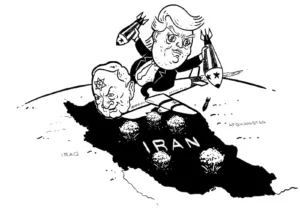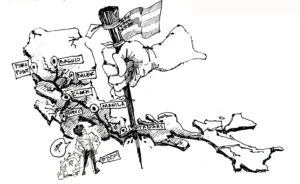Impact on the Philippines
As a semi-colonial and semi-feudal country, under foreign and feudal domination, the Philippines has an inherently and chronically crisis-stricken economy and society. The only way it can end the underdeveloped, agrarian, pre-industrial and semifeudal character of the economy is to undertake national industrialization and land reform. These were previously prevented by the World Bank-sponsored Keynesian fiscal policy of promoting infrastructure-building to serve raw material production and commerce.
The current "neoliberal" globalization policy of denationalization, liberalization, privatization and deregulation has been far more aggressive in preventing industrial development and land reform. Under this policy, the Philippine economy has become more deeply underdeveloped and more rotten than before and become more vulnerable to the worsening crisis of the world capitalist system.
The "neoliberal" policy is imposed on the Philippines by the US through its puppets. It expressly prohibits the leaders of the reactionary government from upholding the key role of the state in mobilizing the people and economic resources for national industrialization and land reform. These twin objectives are supposed to be decided by the market rather than by the state and the people. Under the influence of "neoliberalism", puppet leaders in the Philippines talk more often about the "free market" than "development" as state-supported industrial development.
The expression "free market" is actually used to mean leveling the field of competition with the bulldozers of the foreign monopolies and flattening the people to the ground. The expression "development" is limited to mean infrastructure-building with the use of onerous foreign loans and foreign supplies as in the time of the Marcos regime. None of the succeeding regimes since that of Aquino, which hyped trade liberalization, have paid even the slightest lip service to a well-founded and comprehensive industrial development, through the cooperation of the state and the Filipino entrepreneurs.
The 1987 constitution of the reactionary state has reduced land reform to a "free market" transaction, with the landlord selling his land voluntarily, demanding current market value or offering the stock distribution option. The principle of state intervention in order to realize social justice, such as the expropriation of landlord estates for affordable redistribution to the tenants, has been laid aside. The landless tillers are given the cynical advice that if they wish to own land they are free to buy even a piece of Forbes Park or buy stocks from Hacienda Luisita of Cory Aquino or from any of the many agricultural corporations of her cousin Danding Cojuangco.
Under the Ramos regime, the so-called medium term development program did not provide for national industrialization and land reform. But it pushed for the denationalization of the economy to benefit the foreign monopolies and big compradors. It violated the principles of economic sovereignty and conservation of the national patrimony. It removed the restrictions on foreign investors in banking, mining, agriculture, domestic trade and other types of enterprises. It allowed the unrestricted flow of foreign capital in and out of the country and the big comprador exporters of raw materials to stash away foreign exchange abroad. It ran far ahead of the schedule set by the WTO for lowering the tariff on all types of products.
The reactionary government incurred huge local public debt and foreign debt for infrastructure, especially in graft-ridden power generation projects conceded to foreign companies. It went into a privatization spree, selling off state assets and prime public land to foreign investors in order to cover trade and fiscal deficits. It created a boom in the private construction of office and residential towers and golf courses with the use of foreign commercial loans and favored the expansion of low value-added semimanufacturing of consumer goods under the auspices of giant corporations and big comprador firms, whose foreign debts are guaranteed by the state.
The financial crisis of 1997 brought down the Ramos regime's claims to economic success. By the time Estrada became president, the reactionary government had gone bankrupt and foreign credit dried up to the extent that he was compelled to serve his corrupt appetite by taking payoffs from jueteng and using social security funds of government and private employees for the shadiest of deals. He was reduced to begging for infrastructure loans from Japan, which wanted to extract excessive trade and investment privileges.
When the turn of Arroyo came, she renewed the orgy of local and foreign borrowing and the frenzy of implementing the "neoliberal" economic policy which she had strongly pushed as a senator. The imperialists were pushing another wave of easy credit in accordance with the "neoliberal" dictum that economic and financial problems are solved by scooping money from the central bank into helicopters for these to pour out on the problem.
Under the "neoliberal" economic policy, the semicolonial and semifeudal character of the Philippines has been aggravated and deepened due to the absence of national industrialization and land reform, the unrestricted freedom of the foreign monopolies to dump their surplus products and to extract superprofits, the ceaseless landlord and corporate accumulation of land, bureaucratic corruption, the limitation on the country to produce for export only raw materials and slightly processed goods, the ever growing trade and fiscal deficits and the ever mounting foreign debt.
Like the Ramos regime, the Arroyo regime has been strenuously insistent on the denationalization of the economy. It has made so many attempts to have the 1987 constitution amended so that nationality requirements and restrictions on foreign investors can be removed from the economic provisions. At any rate, it has pushed further legislation as well as multilateral and bilateral treaties and executive agreements to promote investment and trade liberalization in favor of foreign investors to the detriment of economic sovereignty, the national patrimony, the working people and the environment.
It has allowed the dumping of foreign surplus manufactures and agricultural products on the country and has thereby undermined and destroyed the domestic production of these. It has continued the privatization of state assets and public lands. These have been sold to foreign corporations and to cronies. Laws seeking to protect the workers, women, children and the environment have been eroded or circumvented in the "neoliberal" spirit of deregulation for the profit-taking purposes of foreign monopolies and the big compradors.
The Arroyo regime has gone into unbridled deficit spending and foreign and local borrowing, mainly for the purpose of profit-taking by the imperialists and the big compradors, bureaucratic corruption and upper class consumption. Statistics of these go into the absurd game of conjuring the illusion of an annual economic growth rate. Counterproductive activities and borrowings which bankrupt the state and the economy are misrepresented as factors of development. Even as the economy is bankrupt and depressed, the Arroyo regime is giving top priority to servicing the foreign debt and is raising the tax burden on the people.
The Arroyo regime is overbrimming with loyalty to its imperialist masters. But now it is faced with the severe problems generated by the crisis of the US and world capitalist system. International credit has tightened. Foreign orders for raw materials and consumer semi-manufactures have decreased. To make matters worse, the prices of fuel and food imports are soaring. The giant oil and food companies have fabricated the media tales of fuel and food shortages in order to make a big killing in the "free market."
The regime does nothing to restrain the foreign monopolies from ceaselessly hiking the oil price and inflating the prices of all basic commodities. For so ong under the policy of trade liberalization, it has allowed the dumping of rice from abroad and has thus destroyed local rice production. It has made the Philippines the No. 1 rice importer of the world. It has also been utterly stupid in failing to build its reserve rice stocks and thus in having to buy rice from the world market when the prices are soaring.





